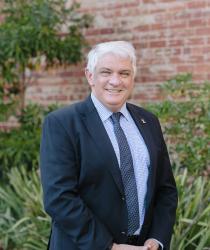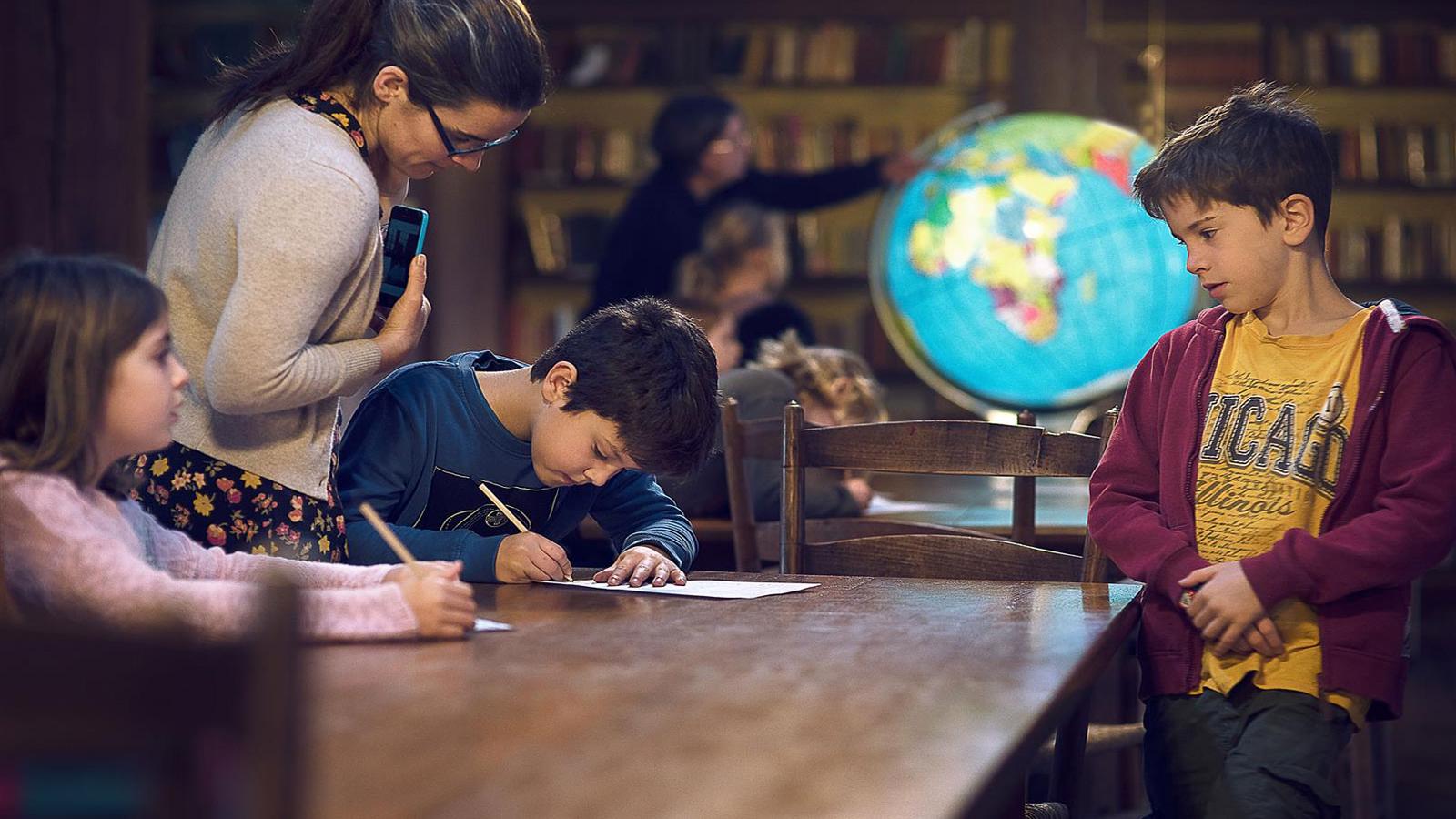
He may have spent just twelve months at Dunhurst but Michael Carr-Gregg remembers it with gratitude as a blissful oasis in the desert of his three-year experience of education in England. The son of a diplomatic family, he was born in Melbourne (his siblings first saw the light of day in New York and Lahore), but he was soon off on a youthful tour of the world which only called into port in the UK in the mid-60s.
With his father an important and busy figure at the Foreign Office, boarding school loomed into view for the seven year-old Michael. His initial experience was sufficiently unpleasant to make ‘Dickensian’ an entirely inadequate word to describe it. “Marsh Court School, which has long since closed, I’m thankful to say, was a place for emotionally disturbed teachers,” Michael remembers with an almost audible shudder. “It was Hogwarts, including the gowns but minus the magic, and one of my main memories is of my brother being hit by a teacher with a whistle for running too slowly. The dorms were named after animals but that was as much of a concession to tenderness as we got. As far as a healthy relationship with the teachers was concerned – forget it! I always had a rebellious streak and I wasn’t prepared to put up with what I knew wasn’t right or fair, so things generally went from bad to worse.”
It had been a lonely and thoroughly depressing introduction to life in the UK but salvation was around the corner for young Michael. His parents decided to abandon the Marsh Court experiment after a year and sent him instead to Dunhurst, where the difference could not have been more extraordinary to the wide-eyed boy. “I felt something like Alice must have done after she had fallen down the rabbit-hole,” Michael laughs. “There was snow and there were toboggans at Dunhurst; there was pony-riding and above all there was the feeling that you were listened to, safe and valued. There was also the most wonderful matron, whom we called Myfy and who embodied everything about the place that I loved. Life was perfect, basically. Those were definitely my salad days.”
Dunhurst was also where Michael developed his abiding love for arts and the theatre: “I learned how to speak in public, to love the contact with an audience and I clearly recall my school report saying that I was destined for a career on the stage,” he says. After just a year of nirvana, however, Michael was on his way again, this time to the forbidding environment of Dulwich College. “That was down to Dad and I was horrified at the decision,” Michael reflects. “He reckoned that I needed more structure than he felt was on offer at Dunhurst. Mum and I completely disagreed with him but Dad overruled us. I was becoming a victim of diplomatic child syndrome and I’ve met a few kids who have been in a similar position. You can’t put down roots, long-term friendships are impossible and there’s no emancipation from your parents; our house was round the back of Westminster Abbey and it’s not an ideal place for a young boy trying to get away on his own and have the kind of adventures that young boys generally want to enjoy.”
Dulwich College, meanwhile, was proving to be an increasingly disastrous time for Michael, culminating in an assault by a fellow pupil that left Michael with a collapsed diaphragm and in need of a four-day stay in hospital. “Some people thought that I’d had it; it wasn’t quite true but it was enough for Mum, who decided that it was time for me to head back to Australia. The Foreign Office were too mean to pay for a flight so I was sent to Tilbury Docks to take a five-week journey to Sydney and a new educational experience, this time at Sydney Grammar, where a certain Malcolm Turnbull (now, of course, Prime Minister of Australia) was Head Boy. The only problem there was my accent – I had a Pommy way of speaking and naturally, the kids were merciless on it. I’d only just started speaking like an Australian again when my father was appointed Deputy High Commissioner to New Zealand and I was sent to a state school there, Wellington College, where an Australian accent was just about the worst thing to have!”
Despite all the travails, Michael had maintained his love of debating and general theatrics that had been so nurtured during his time at Dunhurst. “I didn’t have an artistic bone in my body, unlike my brother, who was a really talented caricaturist, but I loved the cut and thrust of public speaking and I had absolutely no fear at all,” he observes. “That carried on at Sydney University right up to the moment that I discovered, at the age of nineteen that I had cancer.”
It was to be the seminal moment of Michael’s life. A lump had appeared on his neck; when it was checked, it was revealed to be a malignant parotid tumour. “My first surgeon, who had the people skills of a pineapple, told me that I probably had eight weeks to live,” he snorts. “It was then a question of having the necessary radiotherapy or succumbing to a painful death. People tend to go through a bit of a religious phase when they get news like that and I was no different. I said to myself that if I were spared, I would do something really worthwhile with myself.”
As soon as remission arrived, Michael was as good as his word. He wrote his PhD thesis on teenagers with cancer (“a cathartic, therapeutic experience”) and, inspired by the writings of the renowned professor and author, Myra Bluebond-Langner, he co-founded and named CanTeen in 1985, the world’s first national teenage cancer patients' support group and still the accomplishment of which he feels proudest. “The system had nothing worthwhile for teenagers; there was so much ignorance about the needs of adolescent patients,” Michael recalls.
Still only 27, Michael was on the way to balancing an astonishing professional workload. His private practice as a nationally registered child and adolescent psychologist began to incorporate cognitive behavioural therapy (CBT), Acceptance and Commitment Therapy (ACT), mindfulness skills and interventions drawn from positive psychology research and rapidly made him one of Australia’s most renowned experts in the field. Not content with this, Michael also became Managing Director of the Young and Well Co-Operative Research Centre, Australia’s leading weapon in establishing and developing the connection between young people’s mental health and the technology that can improve it. A founder member of the National Centre against Bullying and for three years (2010-13) the official advisor on cybersafety to the Queensland State Government, Michael has also somehow found time to write nine hard-hitting and influential books on the subject that is both his occupation and his passion.
“If you really believe in something, then there’s no end to the possibilities that you have or the energy that you can bring to them,” Michael reasons. “There’s so much to be done in the fields of mental health and technology and so many people with so much talent that I can tap into to help things along that it’s amazing what we can accomplish together. Being part of a team of people cleverer than me is inspirational and I can’t imagine anything that I’d rather do. Retirement is the last thing on my mind.”
The rebellious streak that Michael first identified in himself way back in childhood hasn’t gone away, either. His books have often been full of challenging insights that have not always pleased the more conservative elements, either of Australian society or his own profession. The title of one, Princess Bitchface, created a controversy in its own right. Michael is amusingly unrepentant about the ups and downs of life in the firing-line. “I don’t mind the critics,” he grins. “Bring it on, I say. What’s the worst that can happen when you’ve had cancer or a collapsed diaphragm? I would point out in passing that Princess Bitchface has sold 96,000 copies and counting and it would be difficult to manage that if I was just being iconoclastic for its own sake.”
Michael is talking on a day when he has returned to Dunhurst for the first time in half a century. “What I love about this place is that the atmosphere seems to remain the same as the one that I enjoyed so much in the 1960s,” he enthuses. “It was a bit more Spartan in my day but to find that all the great things about here are as they were or even better is quite remarkable. Dunhurst showed me that anything was possible and I’ll always be grateful for that.”
The future looks encouragingly well-stuffed with new opportunities as well, quite possibly beyond the borders of his native country. “My sister lives in Cupertino, in the middle of Silicon Valley, where suicides among the young are far from unknown,” he says. “Young people need help all over the world and if we can teach people to use their technology to manage and improve their mental health here, it must be possible anywhere.”
Find out more at www.michaelcarr-gregg.com.au
Michael Carr-Gregg was interviewed by James Fairweather in February 2016.
